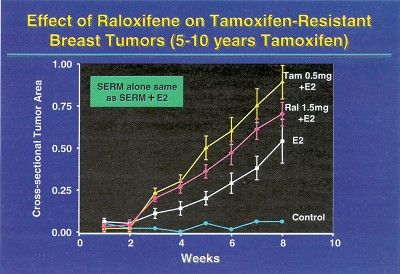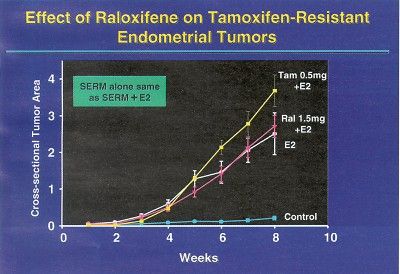Raloxifene Not Recommended After Tamoxifen Failure
SAN FRANCISCO-Five years of tamoxifen (Nolvadex) is standard treatment for many women with estrogen-receptor (ER)-sensitive breast cancer, but the question of what to do after that is unresolved. Raloxifene (Evista) has been considered by some researchers as a possible next treatment, but preclinical data suggest this will not be a successful strategy. Ruth M. O’Regan, MD, of Northwestern University Robert H. Lurie Comprehensive Cancer Center, presented the data at the 37th Annual Meeting of the American Society of Clinical Oncology (ASCO abstract 95).
SAN FRANCISCOFive years of tamoxifen (Nolvadex) is standard treatment for many women with estrogen-receptor (ER)-sensitive breast cancer, but the question of what to do after that is unresolved. Raloxifene (Evista) has been considered by some researchers as a possible next treatment, but preclinical data suggest this will not be a successful strategy. Ruth M. O’Regan, MD, of Northwestern University Robert H. Lurie Comprehensive Cancer Center, presented the data at the 37th Annual Meeting of the American Society of Clinical Oncology (ASCO abstract 95).
Neither tamoxifen nor raloxifene blocked estrogen-stimulated tumor growth in mouse models. "Tamoxifen and raloxifene are cross-resistant in models of tamoxifen-resistant breast and endometrial cancer. We should not assume that raloxifene will be effective after 5 years of tamoxifen," Dr. O’Regan said.
Furthermore, she said, there is evidence from this study that raloxifene, like tamoxifen, can stimulate the growth of some breast or endometrial cancers.
Raloxifene attracted the interest of breast cancer researchers because it is an antiestrogen but, unlike tamoxifen, does not cause endometrial thickening. "We now know that tamoxifen increases the risk of endometrial cancer by threefold to fourfold in women," Dr. O’Regan said.
In this study, athymic mice were bitransplanted with breast cancer tumors on one side and endometrial tumors on the other, and treated with tamoxifen or raloxifene, with and without postmenopausal levels of estrogen.
The study used models of tamoxifen-sensitive cancers and of both short-term and long-term tamoxifen-resistant cancers, simulating the situation of women with breast cancer who develop progressive disease while on tamoxifen.
Tamoxifen and raloxifene had similar effects in all the models tested. In tamoxifen-sensitive tumors, neither drug stimulated growth of breast or endometrial cancers. In the short-term tamoxifen-resistant breast cancer model, both raloxifene and tamoxifen stimulated tumor growth. In the long-term tamoxifen-resistant models, both drugs stimulated growth of tamoxifen-exposed endometrial and breast cancers.


"These results suggest that if raloxifene is used for osteoporosis prevention after 5 years of tamoxifen, it could result in the growth of occult breast cancer or endometrial cancer," Dr. O’Regan said.
Raloxifene also appears to be cross-resistant with tamoxifen in the short-term tamoxifen-resistant breast cancer model, supporting the clinical finding that it is not of value in the treatment of advanced tamoxifen-refractory disease.
"I would certainly be cautious about using raloxifene after 5 years of tamoxifen. A number of ongoing trials are looking at aromatase inhibitors, which may be the way we should go," Dr. O’Regan said. In discussing this paper, Matthew Ellis, MD, PhD, of Duke University, said, "Tamoxifen and raloxifene are definitely cross-resistant. Do not use raloxifene in place of tamoxifen for breast cancer treatment. Do not routinely use raloxifene after tamoxifen to manage osteoporosis. Use bisphosphonates."